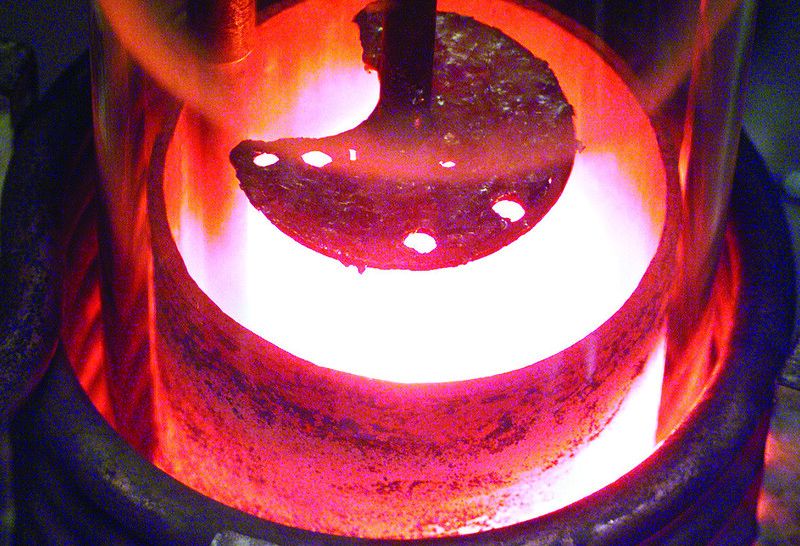The Ukraine invasion highlights why Biden’s Nuclear Posture Review should endorse bold new vision for nuclear security
By Nickolas Roth | February 28, 2022
 "Molten plutonium in processing" by Los Alamos National Laboratory is licensed under CC BY-NC-ND 2.0
"Molten plutonium in processing" by Los Alamos National Laboratory is licensed under CC BY-NC-ND 2.0
The political crisis and human tragedy unfolding in Europe as a result of Russia’s invasion of Ukraine will dominate national security debates for the foreseeable future. As the world’s eyes focus on this conflict in the coming days and weeks, the Biden administration will likely also be rolling out key nuclear policy documents. There will be many issues to consider, but one that shouldn’t be missed—the urgency of which has been highlighted by recent developments in Ukraine, and particularly around the Chernobyl site—is the security of nuclear materials.
Every US president for more than two decades has warned about the dangers of nuclear terrorism and the need for strong nuclear security to reduce that threat. Speaking at the 2021 Munich Security Conference in one of his first major national security addresses, President Biden reaffirmed this as a US priority, emphasizing the need for international cooperation to “lock down fissile and radiological material to prevent terrorist groups from acquiring or using them.” With strained political relationships between countries with the largest nuclear stocks, the proliferation of new technologies like drones that pose threats to nuclear facilities, and the expansion of nuclear stockpiles creating new targets for theft, there are serious risks that need to be addressed. Over the next few weeks, the Biden administration will have an important opportunity to seize upon longstanding bipartisan support and endorse a bold new vision for strengthening international nuclear security.
The Biden administration will soon be releasing its Nuclear Posture Review (NPR), a document outlining US nuclear weapons policy. The NPR is often controversial, exposing ideological fault lines on a range of national security issues. Yet, one area in the document where there has been little disagreement has been on the topic of reducing nuclear terrorism risks.
In its 2010 NPR, the Obama administration argued that nuclear terrorism was the “most immediate and extreme danger” facing the United States, citing the “vulnerability to theft or seizure of vast stocks of such nuclear materials around the world.” The Obama administration pledged to “accelerate efforts to prevent nuclear terrorism” through several important initiatives, including nuclear security summits, increased funding for US programs aimed at reducing nuclear terrorism risks, accelerating US programs to remove and secure “high-priority vulnerable nuclear material around the world,” and increasing security in nuclear facilities around the world. The Obama administration was able to accomplish much of its bold agenda.
The Trump administration’s worldview could not have been more different from the Obama administration. Yet on the issue of nuclear security, President Trump’s NPR followed in the footsteps of his predecessor. The 2018 NPR states that “[n]uclear terrorism remains among the most significant threats to the security of the United States, allies, and partners.” It prescribes a “multilayered” approach, focused on “securing nuclear weapons, materials, related technology, and knowledge, to prevent their malicious use” and enhancing “cooperation with allies, partners, and international institutions to prevent nuclear terrorism.”
The Biden administration’s NPR should support and advance the goals articulated by both the Obama and Trump administrations. It should recommend the development of a long-term, whole-of-government plan to support strong and sustainable nuclear security for the world’s stocks of nuclear weapons, highly enriched uranium, separated plutonium, and major nuclear facilities. The plan should include an initiative focused on transitioning from the longstanding Cooperative Threat Reduction (CTR) approach to a new model for nuclear security cooperation focused on sustained engagement and continuous improvement. Unlike the CTR approach, which was based largely on donor-recipient relationships, this new approach should focus on engaging with other countries as peers, and providing encouragement and expertise when needed.
The Biden NPR should emphasize the need for prioritizing cooperation with countries that face the greatest risks, even where there is political friction, as in the case of China, or conflict, as with Russia.. There may be obstacles to such engagement, but making sure nuclear materials do not fall into terrorist hands is clearly in US national interests wherever those materials may be. The situation in Ukraine makes such cooperation with Russia a particular challenge, and identifying the path forward is difficult. Still, US-Russian cooperation to reduce the risk of nuclear terrorism will make all countries safer. For example, this type of cooperation led to the removal of all of the highly-enriched uranium—approximately 234 kilograms located in Kyiv, Kharkiv, and Sevastopol—from Ukraine between 2010 and 2012. The presence of vulnerable nuclear-weapons useable material in a war zone would have made a humanitarian catastrophe even more dangerous.
A novel vision for strengthening international nuclear security will require additional funding for related programs. As an investment in US national security and against the threats of nuclear and radiological terrorism, the US government should expand and revitalize its international nuclear security programs, supporting deeper cooperation with new and existing partners, with ambitious objectives focused on consolidating and minimizing weapons-useable nuclear material, protecting against insider threats, and improving nuclear security implementation. It should also provide the personnel to accomplish these goals. Unfortunately, over the past five years, funding for these programs averaged $461 million—hundreds of millions less than the high point of the Obama years.
Finally, the Biden administration should commit to bolstering the international treaties and institutions that support stronger nuclear security. This should include increasing financial and political support for the International Atomic Energy Agency and active US diplomacy to ensure the 2022 review conference for the amended Convention on Physical Protection of Nuclear Material—the key binding international agreement strengthening global nuclear security—produces an agreement for regular and substantive future review conferences.
After decades of progress strengthening nuclear security around the world, some policymakers think preventing nuclear terrorism no longer needs to be a priority. This could not be further from the truth. Reducing the risk of nuclear terrorism is an enduring challenge that must remain a priority as long as nuclear weapons and the materials used to build them exist. This is an important moment for meaningful action.
Together, we make the world safer.
The Bulletin elevates expert voices above the noise. But as an independent nonprofit organization, our operations depend on the support of readers like you. Help us continue to deliver quality journalism that holds leaders accountable. Your support of our work at any level is important. In return, we promise our coverage will be understandable, influential, vigilant, solution-oriented, and fair-minded. Together we can make a difference.














